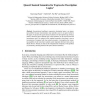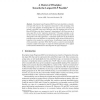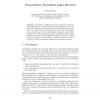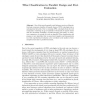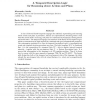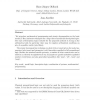123
click to vote
DLOG
2009
14 years 12 months ago
2009
Abstract. Inconsistency handling in expressive description logics is an important problem because inconsistency may naturally occur in an open world. In this paper, we present the ...
129
click to vote
DLOG
2009
14 years 12 months ago
2009
In this work we summarize our recent results on extending Description Logics for reasoning about prototypical properties and inheritance with exceptions. First, we focus our attent...
117
click to vote
DLOG
2009
14 years 12 months ago
2009
Abstract. Description Logic Programs (DLP) have been described as a description logic (DL) that is in the "expressive intersection" of DL and datalog. This is a very weak...
142
click to vote
DLOG
2010
15 years 1 days ago
2010
Abstract. Inconsistency handling is of growing importance in Knowledge Representation since inconsistencies may frequently occur in an open world. Paraconsistent (or inconsistency-...
117
click to vote
DLOG
2010
15 years 1 days ago
2010
Abstract. One of the most frequently used inference services of description logic reasoners classifies all named classes of OWL ontologies into a subsumption hierarchy. Due to emer...
129
click to vote
DLOG
2010
15 years 1 days ago
2010
Semantic interoperability is essential on the Semantic Web to enable different information systems to exchange data. Such interoperability can be achieved by identifying similar in...
131
click to vote
RR
2010
Springer
15 years 13 days ago
2010
Springer
Translations to (first-order) datalog have been used in a number of inferencing techniques for description logics (DLs), yet the relationship between the semantic expressivities o...
133
click to vote
JSC
2010
15 years 14 days ago
2010
We study the problem of deciding whether two ontologies are inseparable w.r.t. a signature Σ, i.e., whether they have the same consequences in the signature Σ. A special case is...
143
click to vote
JAIR
1998
15 years 1 months ago
1998
A class of interval-based temporal languages for uniformly representing and reasoning about actions and plans is presented. Actions are represented by describing what is true whil...
126
click to vote
AI
1999
Springer
15 years 1 months ago
1999
Springer
Forthcoming in the Journal of Aritificial Intelligence We introduce mathematical programming and atomic decomposition as the basic modal (T-Box) inference techniques for a large c...
